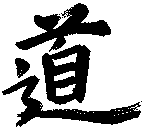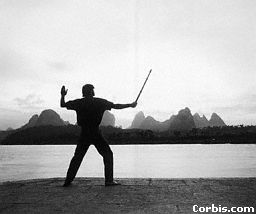 |
Taoism And The Taoist Arts |
|||
Taoist T'ai Chi (taiji) |
||||
Background & History: The Taoist Arts: |
By stimulating the flow of internal energy (chi) within the body it improves health, aids longevity and can be used as a potent martial art. As a technique for self development, it also has a spiritual side. In China there are many styles of T'ai Chi, but all have their roots in Taoism - T'ai Chi is really applied Taoism, the philosophies brought to bear as physical exercise. Fewer styles are available in the West, but the number grows steadily and there is a good choice available. T'ai Chi means 'supreme ultimate' and the claims made of it are often very grand. The first thing most students notice is a feeling of relaxation following the classes; with time this can become a profound feeling of calm and peace. Regular T'ai Chi practice also has a noticeable benefit on health - minor illnesses such as flu become less common, and recovery comes more quickly. As the student begins to develop softness and sensitivity and gains experience with pair-work the effects can spill over into everyday life, aiding interactions and reducing stress and worry. As a non-physical form of exercise T'ai Chi is suitable for any age or sex, and appeals to a varied cross section of people. The postures and movements involved have been shown to improve muscle tone, flexibility and balance and can be a marvelous help to those with postural difficulties or pain and stiffness in the neck and back. The 'typical' T'ai Chi class will consist of a short warm up routine of stretches, a number of breathing exercises (often known as Chi Gung) and a little pair work, often an exercise called sticky or pushing hands, which emphasizes balance, sensitivity to others and softness, as well as being a practical demonstration of the theory of yin and yang. The class will also practice one or more 'forms' - the sets of movements which most people think of when they consider T'ai Chi. These forms can be hundreds of movements long and take many years to learn fully. A high degree of precision is required and at first the beginner may feel that they are being overly corrected, however, the first few moves are always the hardest to learn and the effects can be great even at the beginning. CHOOSING A CLASS As with all things Taoist, choosing a class or teacher is a very personal experience, so it is difficult to give general guidelines. However, there are a few points worth making. Firstly, it is essential that you get along with the instructor(s) - you won't learn much if you don't, and you must feel at ease in the class, and performing the movements. At first it is natural that you might feel a little apprehensive or foolish as you struggle to learn, but you should know after a few lessons if T'ai Chi is for you. Though many find is suits them perfectly, you might find that some other form of meditation or exercise is better for you. I would also advise the not too much attention is paid to membership of societies and ancient lineage of masters. In China in the ancient times a master was simply someone who lots of people approached to learn from. A grand master was a widely respected person who other 'masters' approached for teachings. Being taught by a so called master is no guarantee that one will master T'ai Chi. That being said, the teacher should be able to clearly tell you what style they are teaching, and who their own teachers are or were, and how long they have trained with them, as well as describing the structure of their organisation. Ask them if they teach the martial applications, and if not why not - it isn't necessarily a bad thing if they don't, but the class will certainly have a different emphasis in this case. Also, do they teach partner exercises such as Push Hands? Again, if they say no, you should ask why. What is the teachers view of or understanding of Chi, and how is it used in their T'ai Chi? Ask as many questions as you like, and if you sense any attempt to hide the truth or evade the questions, walk away. Any good teacher will be happy to explain basics like this to you. Look at the teacher and the senior students and see if they are demonstrations of what is supposedly being taught. Do they have an appropriate manner and attitude? Do they have good posture, and move with ease? Do they, for the most part, look healthy and contented? Are they welcoming to new students, and willing to help you learn? You will find that the cost of a class varies enormously, too. Some teachers teach for free, or charge just enough to cover their costs. If you're lucky enough to find one of these you can be sure that at the very least, they aren't in it for the money! Most will charge either per class, or ask for a payment up front for a block of, say, 10 classes. You will often be charged an annual membership fee which covers basic admin and insurance - if you are asked for any kind of fee like this don't be afraid to ask exactly what you are paying for and what the money goes on. Most groups allow you a few sessions to try it out before you have to pay this annual fee. If you are happy with the answers to your questions, go to a class, and provided you enjoy it, make sure you try a few before making any decisions. Shop around - go to as many different classes as you can - and you'll really begin to appreciate the differences between them. Before long you'll have a clear idea which direction to go in. And above all, have fun!
Note: Those who already practice T'ai Chi may find books contain useful pointers and those who are curious can pick up background information, but I cannot recommend actually learning T'ai Chi from a book. The fine detail of the movements could not be put across in even the most detailed of manuals.
|
|||
|
|
||||

